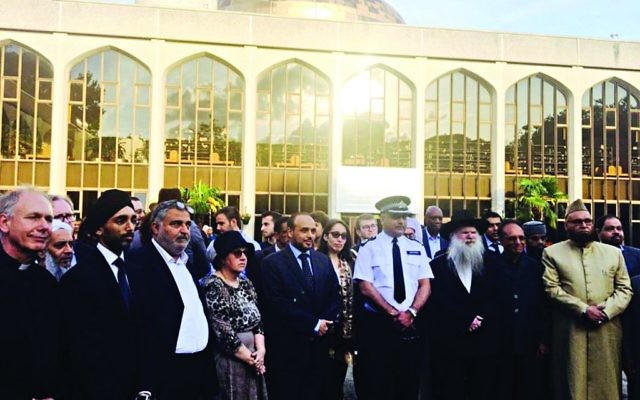Faiths unite around ‘shared social values’ at times of crisis, report shows
'Trust in Crisis' study by the Woolf Institute claims religious communities are better at working together than non-faith groups after disasters
Jenni Frazer is a freelance journalist
A new report from the Cambridge-based Woolf Institute, which studies relations between Judaism, Christianity and Islam, says religion is a unifying factor based on “shared social values” in times of crisis. And the Institute calls on the government to create a full-time post for dialogue between religions, similar to one which exists in Berlin.
Woolf asked the national polling company, YouGov, to analyse the situation in four major European cities — London, Paris, Rome and Berlin. The findings showed that in times of crisis, such as in the response to terror attacks, faith communities were more likely to work together. The Woolf Institute concluded that “faith and minority communities are the key to cohesion, not the driver of division”.
Crisis “triggers” in Europe include economic struggles, the influx of refugees, austerity measures, terrorism, the rise of narrow nationalism and dissatisfaction with “the establishment”.
But in response, the findings show, “grassroots initiatives conducted by minority communities are building trust, based on shared social values through times of crisis. The result is solidarity, social cohesion and community innovation across Europe”.
Polling of British adults has revealed that more people felt connected to their local community over Britain as a whole; and that people of faith “were more likely to express a strong connection to their local community and much less likely to state a strong connection to their country than some other demographic groups”.
Additionally the survey, known as Trust in Crisis, showed that those who say they have no religious identity are more critical of government. Fifty-four per cent believe that in a crisis that the government has been bad at providing support, compared with 46 per cent who identify as religious.
“Trust in Crisis” found that faith-based groups were more engaged in the public sphere, providing emergency services and making on-the-ground objections to policy.·Local citizenship was more active in public affairs, often bringing together groups across religious and ethnic lines for shared purposes.
Commenting on the findings, Dr Ed Kessler, founding director of the Woolf Institute, said: “The tragedies the UK has faced in the last few weeks alone has placed the importance of local and faith-based communities into sharp focus. Trust In Crisis identified that faith and minority communities are the key to cohesion, not the driver of division as is so-often reported. We must celebrate this new kind of citizenship, those people in our community who are taking it upon themselves to provide support and unite our local communities.”

Thank you for helping to make Jewish News the leading source of news and opinion for the UK Jewish community. Today we're asking for your invaluable help to continue putting our community first in everything we do.
For as little as £5 a month you can help sustain the vital work we do in celebrating and standing up for Jewish life in Britain.
Jewish News holds our community together and keeps us connected. Like a synagogue, it’s where people turn to feel part of something bigger. It also proudly shows the rest of Britain the vibrancy and rich culture of modern Jewish life.
You can make a quick and easy one-off or monthly contribution of £5, £10, £20 or any other sum you’re comfortable with.
100% of your donation will help us continue celebrating our community, in all its dynamic diversity...
Engaging
Being a community platform means so much more than producing a newspaper and website. One of our proudest roles is media partnering with our invaluable charities to amplify the outstanding work they do to help us all.
Celebrating
There’s no shortage of oys in the world but Jewish News takes every opportunity to celebrate the joys too, through projects like Night of Heroes, 40 Under 40 and other compelling countdowns that make the community kvell with pride.
Pioneering
In the first collaboration between media outlets from different faiths, Jewish News worked with British Muslim TV and Church Times to produce a list of young activists leading the way on interfaith understanding.
Campaigning
Royal Mail issued a stamp honouring Holocaust hero Sir Nicholas Winton after a Jewish News campaign attracted more than 100,000 backers. Jewish Newsalso produces special editions of the paper highlighting pressing issues including mental health and Holocaust remembrance.
Easy access
In an age when news is readily accessible, Jewish News provides high-quality content free online and offline, removing any financial barriers to connecting people.
Voice of our community to wider society
The Jewish News team regularly appears on TV, radio and on the pages of the national press to comment on stories about the Jewish community. Easy access to the paper on the streets of London also means Jewish News provides an invaluable window into the community for the country at large.
We hope you agree all this is worth preserving.






















